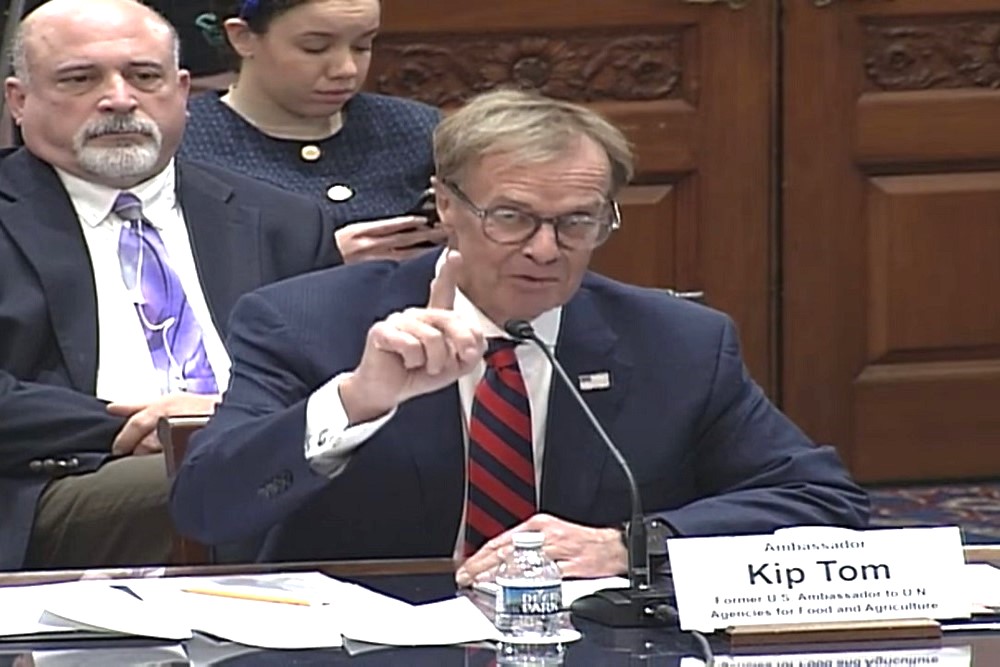Farmer and Former US Ambassador Kip Tom Addresses Chinese Threats to US Agriculture During House Ag Committee Testimony

You’ve been hearing a lot about the danger that China poses on U.S. agriculture. That’s why an ag leader spoke before Congress this week to share with lawmakers just how serious those dangers have become.
Kip Tom, an Indiana farmer and former U.S. Ambassador to the U.N. Agencies for Food and Agriculture, spoke Wednesday during a hearing held before the House Ag Committee to address the threats that China poses on American agriculture.
Tom believes that the U.S. food and agriculture sector isn’t adequately prepared for a major cyberattack against our key suppliers—nor does the U.S. possess the ability to respond in case of such an attack.
“Farming operations could be halted by ransomware attacks demanding payments to restore access to essential digital systems,” said Tom. “We all can remember the ransom attacks on JBS several years ago which disrupted the entire supply chain—from livestock production operations to the consumers dinner table. The $11 million ransom was paid, but the cost to JBS and the agricultural supply chain was many multiples greater.”
Tom also shared a personal experience about Chinese nationals who were discovered stealing U.S. ag research information and sending it back to China.
“The Chinese have targeted proprietary farming data, such as crop yield data, seeding or fertilizer algorithms, breeding information, and biotechnology research which will lead to a loss of competitive advantage for the United States,” Tom said. “I have seen this first-hand in the seed production industry. Several Chinese nationals were sending proprietary seeds in our area from production fields and shipping them back to China. These Chinese nationals were caught and convicted, but how many were not caught?”
He said that the Chinese government is also making every attempt to spy on the U.S. Department of Agriculture (USDA), as well as our top ag businesses and manufacturers.
“The Chinese are creative in their attempts to steal as much information as possible from as many sources possible from the USDA FSA (Food Service Agency) offices to our industries, and from any conduit that flows data or conversations.”
“Although the U.S. government is aware of these threats, we need to strengthen the protection for America’s food supply and economic advantage. This includes identifying vulnerabilities and improving the protective measures of government and private entities against cyber threats,” he said.

Tom also shared with lawmakers that China has a stronghold on manufacturing products that are essential to agriculture. He said 70 percent of all crop nutrition products come from China.
“This is a national security threat to the United States and our allies,” he said. “Imagine if they shut off our supply? Without crop protection products or crop nutrients, yields will decrease requiring substantially more land to maintain current production levels. The economic impact of farmers consumers and our nation would have devastating consequences. This would lead to higher consumer prices and food insecurity in the United States and around the world.”
He added that China has been using agriculture to strengthen their control over the U.S. and other countries around the world.
“[Chinese President] Xi Jinping and the Chinese Communist Party (CCP) recognize the importance of food in relation to their position of power in the world,” he said. “The CCP’s goal is to reshape the world order through their control of the BRICS nations (Brazil, Russia, India, China, and South Africa), global trade, and their ‘Belts and Road Initiative’—all to attain economic superiority over the United States and our allies to meet these goals. They are strategically growing their agriculture production domestically and globally at the expense of the United States.”
Tom pressed lawmakers to do more in response to those threats from China.
“The Chinese are strategically attempting to build their dominance in a world over food systems,” said Tom. “These moves are coming at the expense of American innovation but are amplified by our burdensome regulatory environment.”
“[Lawmakers] need to take action to bring our supply chains home, protect our innovation, and increase our funding for research and development. Now is the time for a national strategy for agricultural and food systems. If not, America could once again face food insecurity like we did 100 years ago,” said Tom.
Click BELOW to listen to Michigan Ag Today’s Eric Pfeiffer and C.J. Miller provide team coverage of Kip Tom’s testimony on the danger China poses to U.S. agriculture during the House Ag Committee hearing.
Click BELOW to watch Kip Tom’s full testimony before the House Ag Committee on March 20. Tom’s statement and testimony begins at the 1:54:13 mark.


